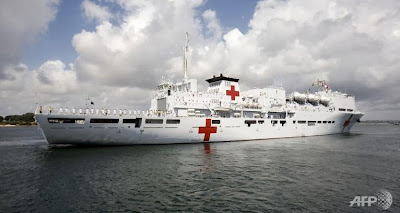Stunned by the world’s most
powerful storm to make a landfall in recorded history, the International
Community responded swiftly to give aid to the badly-devastated provinces of
the Philippines as the natural disaster feared claimed thousands of lives.
The United States, Canada, Japan, United Kingdom and Israel are just
some of the 28 nations and organizations who immediately provided humanitarian
assistance to the Philippines as the victims of Typhoon Haiyan, locally known
as Typhoon Yolanda, struggle to survive.
View full report of Foreign Aid: www.gov.ph/faith/full-report
However, despite of the urgent call to help the storm-ravaged Philippines,
including the United Nations’ plea, the world’s second largest economy was seemed
singled out for its paltry donation.
The outpouring pledges of international community, both public and
private, makes China's contribution for typhoon relief look like a trickle and
a disgrace to Chinese leadership.
China was seems like battered by the tail-end of Typhoon Haiyan as
criticisms strike its government for only pledging $200,000, including the
amount given by Chinese Red Cross, to the Philippines, an initial donation that
was dwarfed by the $20 million, $16 million and $30 million donations of the
United States, United Kingdom and Japan respectively.
China has since increased its donation to $1.6 million, but it still even
falls short behind the Swedish furniture chain Ikea's offer of $2.7 million
donation, through its charitable foundation and Coco-Cola’s promise of $2.5
million in aid.
Some experts in international relations viewed China’s reluctance in
giving more aid to the Philippines as an action influenced by the latter’s
on-going conflict with the Philippines.
China and the Philippines’s relation have been frayed over the past
years, after the two Asian nations embroiled in a standoff over the tiny group
of islands in the South China Sea, which the Philippines recently renamed as
the West Philippines Sea.
For Zheng Yongian, a China politics expert at the National University
of Singapore, despite of the growing influence of China in the region, it still
remains lags far behind the U.S in sphere of soft power, a non-traditional form
of diplomacy in which emergency assistance is a major component.
"China has missed an excellent opportunity to show itself as a
responsible power and to generate goodwill," said Zheng "They still
lack strategic thinking."
Zheng also explained that Chinese leadership is still bound with
old-fashioned major-nation diplomacy based on economic and military might.
Meanwhile, for Phillip Swagel, a former assistant secretary for
economic policy at the U.S. Treasury Department, this incident only unveils
China’s limited friendship relations with its neighbouring countries.
 In his interview with the United
Press International (UPI), Swagel said
"China's action illustrates the blundering nature of its foreign
policy."
In his interview with the United
Press International (UPI), Swagel said
"China's action illustrates the blundering nature of its foreign
policy."
"This is an unforced error for them, revealing to other countries
the limits of Chinese friendship," he added.
However, for Bonnie Glaser, an East Asia adviser at the Center for
Strategic and International Studies, it is not unusual for China not to give
more aid to other countries because it still sees itself as a third world
country.
"The leadership worries that they would be criticized if they were
found to be giving too much money away and not helping the poor at home,"
Glaser said.
China even insisted, in response to global criticisms, that their
country was also hit by Typhoon Haiyan, putting some of its provinces under
water.
The International Community remains monitoring the situations in the areas
affected by Typhoon Haiyan as foreign assistance, particularly military relief
operations of U.S, U.K, Japan, South Korea and Israel, seemingly makes the Philippines
a center stage for world powers to show off their military strengths.
This even makes the Chinese power invisible in one of the world’s
massive humanitarian missions, after the latter only sent its 14,000-ton navy
hospital ship, the ‘Peace Ark,’ to the Philippines compared to the planes,
warships and aircraft carriers sent by other forces.
In the meantime, relief and recovery operation continues in the
Philippines weeks after Typoon Haiyan battered the central part of the
archipelago.
According to the National Disaster Risk Reduction and Management
Council (NDRRMC), more than 9 million people were affected in 44 provinces, 536
municipalities and 55 cities. Nearly 3.5 million were displaced, with about
400,000 of them finding shelter inside evacuation centers.
Based on the NDRRMC report, as of November 30, 2013, the death toll from
the devastation wreaked by Typhoon Haiyan has hit 5, 598, with the number
expected to rise further as some areas still left unsearched.
Typhoon Haiyan, apparently, not only unveils the worsening threat of
Global Warming to the world, but also the capability of China to be the world’s
next ‘Super Power’. – Vic Saure





.JPG)
.jpg)